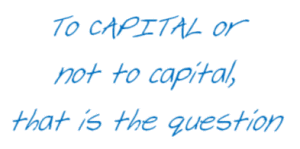I hope you find my writing and business tips and observations useful. My business and blog are dedicated to helping businesses communicate clearly and reach their potential.
Read, subscribe to my newsletter, enjoy!Tash
Winning despite poor template use
I may soon be $5,000 richer.
Then again, I may not be as I know my chances of winning a competition are somewhat less than 100%!
Reading the competition terms…
I just entered a competition, after looking through the terms. I don’t read the terms in full but I always check if there are unexpected uses of my email address before I give it to someone.
In this case, adding me to a single mailing list was acceptable so I entered.
However, I also noted a few things in the terms that were silly.
I think they have used a generic set of competition terms, adding in a few specific details but leaving everything else as it was in the template. To me, this looks like they were too lazy to bother writing or editing their terms.
Let’s assume they had permission to use that template rather than breaching copyright by copying someone else’s terms. They could still face legal issues if something in the template doesn’t apply to their current situation – like how winners are notified.
Dubious terms
To enter, I gave my name and email address – no postal address or phone number.
According to the terms, if I win, I will be ‘contacted by phone and email’. Interesting idea given they don’t have my phone number…
A single prize of $5,000 is on offer to the winner. Yet, ‘the prize… is not transferable as cash.’
This competition is ‘only open to everyone worldwide…’ The use of only and everyone doesn’t quite work – presumably it makes more sense for competitions where ‘only open to customers’ or ‘only open to Australian residents’. A quick read of the completed sentence could have shown the wisdom of deleting ‘only’.
[Tweet “Not editing a template to use it appears lazy.”]
Have you ever seen someone use a template without thinking to update all the relevant details in it?
Was the result funny or did it damage the business’ reputation (or both!)?
Capital letters
I suspect the increased use of SMS and chat shorthand is a major factor, but it seems that many people aren’t sure about when to use capital letters in their writing. So here is a quick summary of when to use a capital letter:
- for the word I – this word must always be written as a capital letter, to do otherwise looks out of place and attracts attention to the lack of attention to detail. As part of an SMS message, I might accept it, but I leave websites where they repeatedly use a lower case i
- to start a sentence – this helps make it clear it is a new sentence and this in turn makes it easier to understand the message and individual ideas
- for all proper nouns – that is, any word that is the name of something specific for example Tash, Melbourne, Australia, Australians and Word Constructions. It does not include generic names such as mothers, business owners, writers, city or students.* Note that the word I is actually a proper noun so my first point is covered here but it was worth a separate point!
- in acronyms – where just the first letter of each word is used to represent the name of something. For instance, the ATO represents the Australian Tax Office and ASAP represents as soon as possible. It doesn’t matter if the full title uses capitals or not, acronyms generally use capitals (sometimes a business may choose to brand themselves with a lower case acronym)
- the start of speech, even if it is not the start of a sentence. For example, she said “We must pay attention to the use of capital letters.”
- days of the week and names of months, as well as names of specific periods of history (e.g. the Second World War, the Depression)
- titles of books, articles, movies and so on can be written in title case (e.g. Full Moon Rising) or just with a starting capital letter (e.g. Confessions of a supermom)
Capitals letters are sometimes also used within names (e.g. AvSuper, MacGregor), in scientific terminology (e.g. E. Coli, Eucalyptus, cyclone Tracy) and where two words have been abbreviated into one (e.g. eBooks, eLearning.)
There are variations in some of these rules, especially if you travel to another country but using these guidelines will avoid any major errors! Or call upon someone to check your writing for you – errors that requires conscious effort for you to find often are quite obvious to others, especially to someone like me who spots such things without trying.
Edited to add: I came across a fun poster with the basic capital letter uses, which is great for kids and anyone struggling to remember these rules.
* The use of a generic noun as a proper noun requires a capital letter, too. So while mothers is written in lower case, a capital letter applies in the following sentence: Mary said “Hello Mother. How are you?” Likewise, you may write about a library (generic) or the Ashburton Library (specific).




Recent Comments